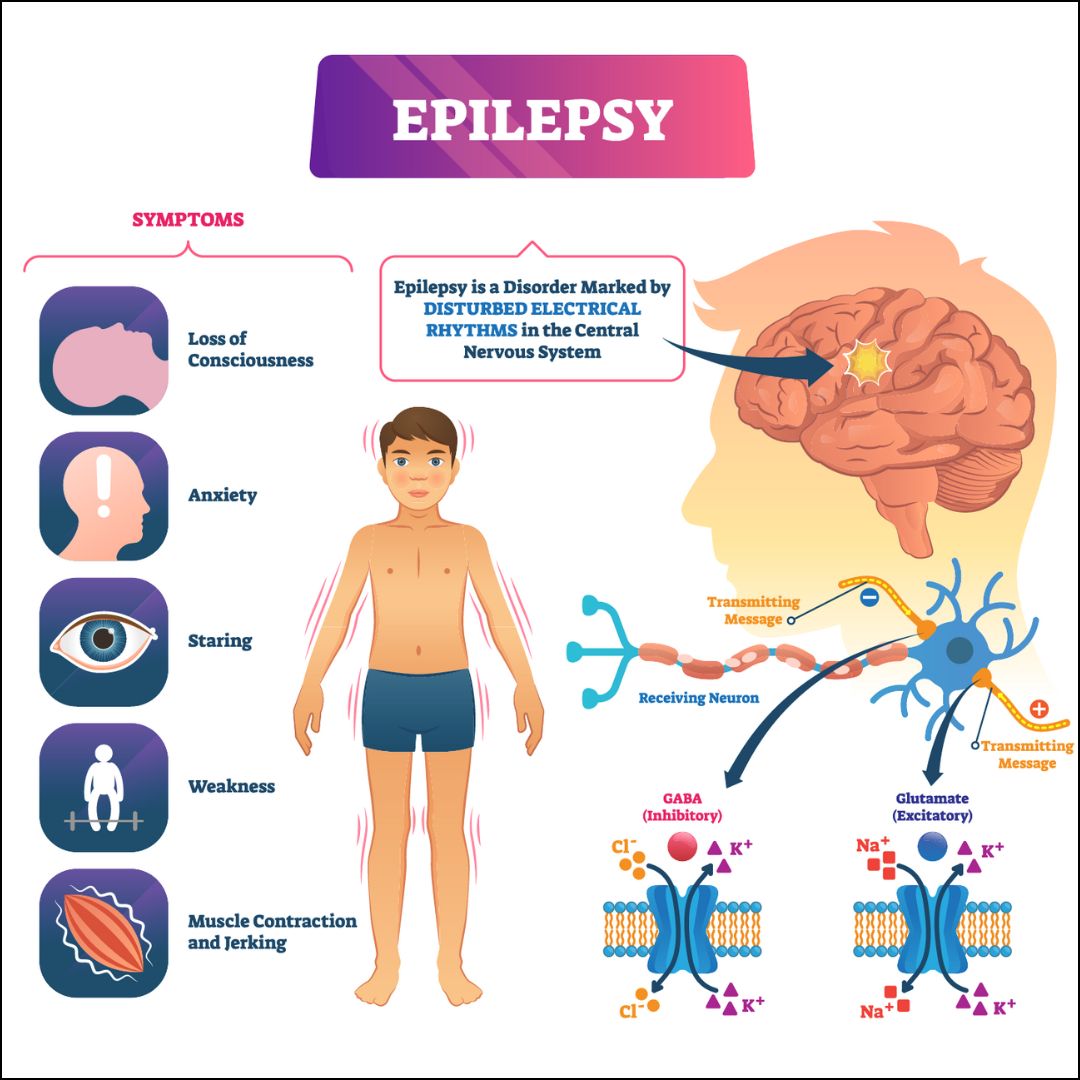Epilepsy Management & Treatment
Epilepsy is a neurological disorder characterized by recurrent, unprovoked seizures. Seizures are caused by abnormal electrical activity in the brain, and their severity can vary widely from mild to severe. Effective epilepsy management focuses on controlling seizures, improving quality of life, and minimizing the impact of the condition. Healtour Solutions connects you with expert neurologists and advanced treatment options in India for optimal epilepsy care.
Common Causes of Epilepsy
Epilepsy can arise from various factors, such as:
- Genetic Factors: Inherited conditions can make some individuals more susceptible to developing epilepsy.
- Brain Injuries: Trauma or injury to the brain, such as from accidents or strokes, can trigger seizures.
- Infections: Infections like meningitis or encephalitis can cause brain inflammation, leading to epilepsy.
- Brain Tumors: Abnormal growths in the brain may cause epileptic seizures.
- Developmental and Structural Abnormalities: Congenital brain conditions and malformations can lead to epilepsy in children.
Common Types of Epilepsy We Manage
- Generalized Epilepsy: Seizures affecting the whole brain, often leading to loss of consciousness.
- Focal Epilepsy: Seizures originating in one part of the brain, with symptoms depending on the affected area.
- Childhood Epilepsy: Epilepsy occurring in children, often linked to genetic factors or developmental issues.
- Adult Epilepsy: Epilepsy that may develop later in life, often due to head trauma, stroke, or other underlying conditions.
- Epileptic Syndromes: Rare forms of epilepsy that are often resistant to treatment and require specialized care.
Symptoms of Epilepsy
- Recurrent seizures (convulsions, staring spells, or unusual movements)
- Uncontrollable jerking or twitching of body parts
- Loss of consciousness or awareness
- Unusual sensations, smells, or feelings before a seizure
- Memory loss or confusion following a seizure
- Loss of bladder control during or after a seizure
If you experience any of these symptoms, it's crucial to seek medical attention for early diagnosis and treatment.
How Epilepsy is Diagnosed
To diagnose epilepsy, a comprehensive approach is required, which may include:
- Medical History and Physical Exam: A detailed review of symptoms, family history, and previous health conditions.
- Electroencephalogram (EEG): A test that measures electrical activity in the brain and can detect abnormal patterns associated with seizures.
- MRI or CT Scan: Imaging tests that help identify structural abnormalities or damage in the brain.
- Blood Tests: To rule out infections, metabolic issues, or other conditions that may cause seizures.
- Genetic Testing: In some cases, genetic tests are used to identify inherited conditions related to epilepsy.
Epilepsy Treatment & Management Options
Treatment for epilepsy is personalized and depends on the type, frequency, and cause of the seizures. Available treatment options include:
1. Medications:
Antiepileptic drugs (AEDs) are the primary treatment for managing seizures in epilepsy. There are several types of AEDs, and the choice depends on the type of seizure, potential side effects, and the individual’s overall health. Commonly prescribed AEDs include:
- Phenytoin
- Lamotrigine
- Valproate
- Levetiracetam
- Carbamazepine
2. Lifestyle Modifications:
In addition to medication, lifestyle changes can help manage epilepsy:
- Sleep Hygiene: Adequate rest is crucial as sleep deprivation can trigger seizures.
- Dietary Changes: Certain diets, such as the ketogenic diet, have been shown to help control seizures, especially in children.
- Stress Management: Reducing stress and anxiety can help reduce the frequency of seizures.
- Avoiding Seizure Triggers: Identifying and avoiding specific triggers, such as flashing lights or particular foods, can be beneficial.
3. Surgical Treatment:
When medications fail to control seizures or if seizures are localized to a specific part of the brain, surgery may be considered. Options include:
- Resection Surgery: Removal of the part of the brain responsible for seizures.
- Vagus Nerve Stimulation (VNS): A device is implanted under the skin to deliver electrical impulses to the brain, reducing seizure frequency.
- Responsive Neurostimulation (RNS): A device is implanted that detects abnormal electrical activity in the brain and sends a corrective pulse.
4. Other Therapies:
- Deep Brain Stimulation (DBS): This involves implanting electrodes in the brain to regulate abnormal electrical signals.
- Cognitive Behavioral Therapy (CBT): While not a direct treatment for seizures, CBT can help individuals cope with the emotional and psychological impacts of living with epilepsy.
Monitoring and Ongoing Care
Ongoing management of epilepsy includes:
- Regular Check-Ups: To monitor seizure control, adjust medications, and assess for side effects.
- Seizure Tracking: Keeping a seizure diary can help identify triggers and assess the effectiveness of treatment.
- Blood Tests: Periodic testing to ensure the right medication dosage and check for potential side effects.
Benefits of Expert Epilepsy Management
- Timely Diagnosis: Early and accurate diagnosis of epilepsy allows for better treatment outcomes.
- Customized Treatment Plans: Each patient’s epilepsy is unique, and care plans are tailored to individual needs, including medication, lifestyle changes, or surgery.
- Access to Leading Specialists: Our network of experienced neurologists ensures expert care for managing epilepsy and seizures.
- Advanced Technology: We use state-of-the-art diagnostic tools and treatment methods to ensure effective care for epilepsy patients.
- Affordable Care: Treatment in India is more affordable compared to Western countries, making high-quality care accessible to international patients.
Why Choose Healtour Solutions for Epilepsy Management?
- Experienced Neurologists: Our network includes some of the leading neurologists in India, specializing in epilepsy and seizure disorders.
- World-Class Hospitals: We partner with top hospitals in India equipped with cutting-edge technology to ensure the best treatment outcomes.
- Comprehensive Care: From diagnosis to long-term management, we offer holistic care for all types of epilepsy.
- Cost-Effective Solutions: We offer affordable treatment without compromising on the quality of care, making India an attractive destination for medical tourism.
- Patient-Centered Approach: We prioritize your comfort and well-being, providing compassionate care throughout your treatment journey.
Step-by-Step Process for Epilepsy Treatment
- Consultation: Start with an initial consultation with one of our epilepsy specialists to discuss your symptoms and medical history.
- Diagnosis: Undergo necessary diagnostic tests, including EEG, MRI, and blood tests, to confirm the diagnosis.
- Treatment Plan: Based on your diagnosis, a personalized treatment plan will be created, which may include medications, dietary therapy, or surgical options.
- Monitoring: Continuous monitoring of seizure control through follow-up visits and regular tests to ensure the effectiveness of treatment.
- Recovery and Aftercare: Post-treatment care includes regular follow-ups, lifestyle changes, and medication adjustments to maintain seizure control.
Contact Us for Epilepsy Management and Treatment
If you or a loved one is living with epilepsy, Healtour Solutions connects you with the best epilepsy specialists in India. Get in touch today for a consultation and take the first step toward better seizure control and improved quality of life.
10 FAQs About Epilepsy Management and Treatment
- What are the main causes of epilepsy?
- Epilepsy can be caused by brain injuries, genetic factors, infections, tumors, stroke, or unknown causes (idiopathic epilepsy).
- How is epilepsy diagnosed?
- Epilepsy is diagnosed through an EEG, MRI/CT scans, blood tests, and sometimes a neuropsychological assessment.
- What types of seizures are associated with epilepsy?
Seizures can be generalized (affecting the whole brain) or focal (affecting part of the brain), with symptoms ranging from loss of consciousness to involuntary movements. - Can epilepsy be cured?
- While there is no cure for epilepsy, most people can manage seizures effectively with medication, lifestyle changes, or surgery.
- What is the treatment for epilepsy?
- Treatment includes anti-epileptic drugs (AEDs), dietary changes (e.g., ketogenic diet), surgery, and in some cases, devices like vagus nerve stimulators.
- Is epilepsy surgery safe?
Surgery is safe for certain patients who do not respond to medications. The risks depend on the type of surgery performed. - Can epilepsy be managed without medication?
- Some individuals may benefit from lifestyle changes or surgical options, but most people need medication for effective seizure control.
- How long does it take for epilepsy treatment to work?
- It may take time to find the right medication and dosage. Regular monitoring and adjustments are necessary for optimal control.
- Can people with epilepsy lead normal lives?
- With proper treatment and management, most people with epilepsy can lead a normal, active life.
- How can I prevent seizures?
- Preventing seizures involves taking prescribed medication regularly, avoiding triggers, managing stress, and getting enough sleep.






